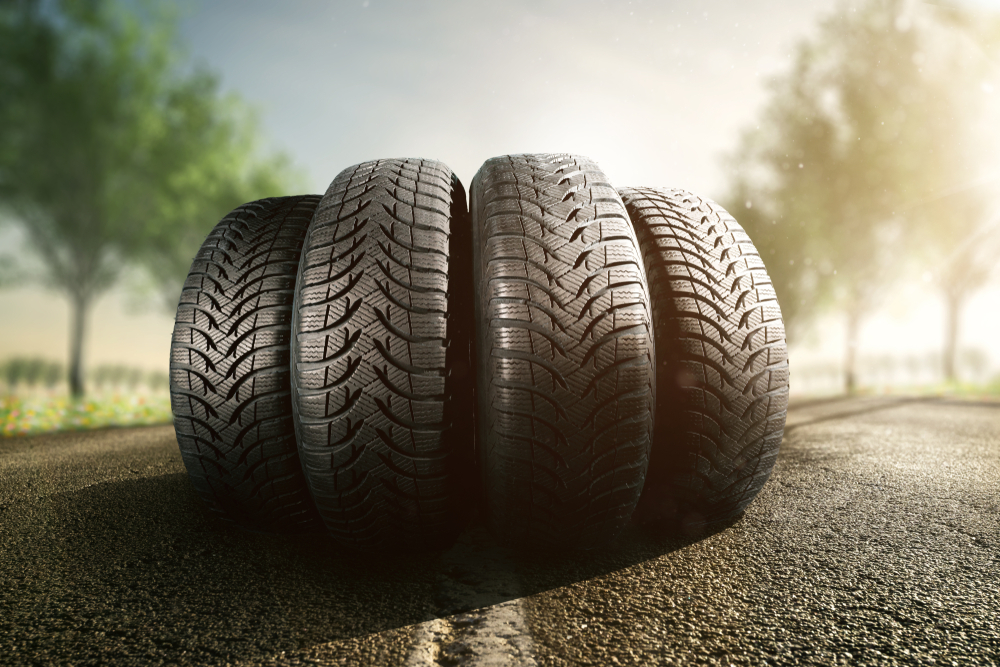When To Rotate Your Tires & Align Wheels

Are Tire Rotations Really Necessary?
You may be asking yourself, is rotating your tires that important? The answer is yes, and it’s actually more important than you may think. But, why?
In this blog, Christian Brothers Automotive's repair and maintenance experts will explain why tire rotations are great for your safety, your tire's health, and the car's overall performance. We’ll also spend a few moments explaining the value of wheel alignments, which, we believe, is a necessary preventive maintenance for your car, especially for your tires.
Why Rotate Your Tires?
Even though your tires are constantly in contact with the road, the tire tread on each tire wears at immensely different rates. If you neglect to rotate your tires on a front wheel drive vehicle, the tread of your front tires will wear much faster than the rear ones. In rear wheel drive vehicles, it is quite the opposite; the rear wheels will wear out faster than the front, because they are bearing the majority of the work.
Rotating tires helps mitigate this issue, allowing your tires to wear evenly. This is important, because it helps prevent many different issues, including:
Uneven braking and acceleration
Increased wear on suspension components, resulting in a harsh ride
Unbalanced handling and lack of traction
A shorter tire lifespan (which is sad…tires are expensive!)
Why Do Front Tires Wear Faster?
Your front tires are responsible for turning your car, which means they shoulder a much greater load. Over time, as you turn both directions thousands of times, these tires accumulate miles far faster than the rear tires. Front wheel drive cars feel this effect far more, as the front tires are responsible for both steering and transmitting the engine’s power to the road. They provide traction and propel your vehicle forward. As a result, they experience greater wear due to the constant forces and friction involved in both steering and powering the vehicle. The same concept is true of the rear tires on a rear wheel drive vehicle, only not as severe. The reason is because the tire wear is often distributed more evenly between the front and rear tires in a rear wheel drive car.
We hope you can see that uneven tire wear is a real thing, so tire rotations are actually a great preventive maintenance plan for the tires you spend so much money on. What about alignments, though? Are they just as necessary?
Don't Skip Your Alignment, Either
You might remember getting asked if you wanted a wheel alignment last time the mechanic recommended a tire rotation. Many drivers may not see the need or value of wheel alignment service, but it is absolutely vital when trying to get the most out of your tires. Here’s a quick mental exercise on alignments:
Imagine a tire floating in front of your face, and it’s as light as a feather. As you look at the tire, it is standing upright, the grooves of the tire tread are facing you, and it is perfectly level as if sitting on the road. Now, tilt the top of the tire either left or right; it’s now at an angle and is out of alignment. It will cause one corner of the tire to wear unevenly. Straighten the tire again. This time spin the tire just a little, turning it to the left or right; it’s out of alignment again and will cause one whole side to wear out faster than the other. Straighten the tire one more time. Finally, push the tire away from you a few inches. It’s once again out of alignment, and in this case your car is in for a very uncomfortable or even dangerous ride.
When your alignment is out, your tires either won't sit perfectly flat on the ground or will be gently dragged along while driving. This means your tires will not wear evenly along the maximum surface area. This is when you see large stripes on tires that have worn far faster than the rest of the tread. It’s normal for the inside edges of tires to wear faster than the outside, but if the disparity is particularly extreme you may have an alignment issue and not rotating your tires only exacerbates the issue.
Avoiding alignments is very much like buying brand new shoes and immediately dragging them on the concrete. Sooner than you’d like you’ll be buying another pair of shoes.
What Happens if I Lose Too Much Tire Tread or Have Uneven Tires?
When your tires become worn out prematurely, you'll need to swap them before the others. Your front tires may be totally bald, but the rears might still have plenty of tread life left on them. This results in mismatched tires, which can endanger control. It can also reduce the resale value of your vehicle, if you’re looking to sell.
Further, tires that are not rotated can be hazardous. For example, balding tires won't have a good grip on wet streets, which implies even a light rain could cause you to lose control when driving. Rotation service helps ensure your vehicle remains safe at all times and in any condition.
How Often Should You Rotate Your Tires?
As a general rule of thumb, rotating your tires every 5,000 miles is a good idea. This is about when you need an oil change service if you’re using full synthetic oil, so it's often recommended to have both services completed at the time. That makes it easy to remember!
On the other hand, the frequency you need your tires rotated may also depend on your driving style. Drivers that stay off of highways and are in a lot of start-and-stop traffic may need to have them rotated more frequently, as off-and-on braking and accelerating, frequent turning, and traffic will all have a much greater impact on tires.
Consulting with a local mechanic is likely your best choice to truly comprehend your car's tire rotation and alignment needs based on the manufacturer’s guidelines and individual driving habits.
Signs It's Time for Car Tire Service
While you may be in between wheel alignments or due for one, there are several signs you can look out for to know when it’s time to have your wheels rotated or aligned. These include:
Uneven tire wear
Drifting to one side while driving
Vibrations on the steering wheel or seat
Noisy tires
The steering wheel does not center itself after cornering
If you notice any of the above signs, don't wait to get your tires rotated or wheels aligned, as it may cause even more problems in the future and create extremely unsafe conditions on the road.
While you’re visiting your local Christian Brothers Automotive shop to get your tires rotated and wheels aligned, ask your CBA team to air up your tires for you. It shall be done! In fact, if you’re ever in the neighborhood, stop by and we will fill up your tires while you wait in the car. It’s free, and we’re glad to do it. Speaking of airing up your tires, did you know that correct tire pressure has a pretty big impact on the life and performance of your tires and even impacts the performance of your car? It does! Read this fascinating next section on correct tire pressure.
The Value of Maintaining Correct Tire Pressure
Maintaining the correct tire pressure is crucial for several reasons, as it directly affects both your safety and the performance of your vehicle. Here's why having the proper tire pressure is important.
Safety
Proper tire pressure is essential for maintaining optimal traction and stability while driving. Underinflated tires can lead to reduced grip on the road, increasing the risk of skidding, hydroplaning, or losing control, especially in wet or slippery conditions. Overinflated tires can also negatively impact handling and braking performance, making it harder to control the vehicle.
Handling & Performance
The correct tire pressure ensures that your vehicle handles as intended by the manufacturer. Overinflated tires can result in a harsh and uncomfortable ride, transmitting more road vibrations to the cabin. Underinflated tires can make the vehicle feel sluggish and less responsive, affecting acceleration, braking, and cornering.
Tire Life
Maintaining the proper tire pressure helps extend the lifespan of your tires. Underinflated tires can cause excessive wear on the shoulders of the tread, leading to premature tire replacement. Overinflated tires wear more in the center of the tread. Correctly inflated tires wear evenly across the tread, maximizing their usable life.
Fuel Efficiency
Proper tire pressure contributes to better fuel efficiency. Underinflated tires create more rolling resistance, requiring the engine to work harder and consume more fuel to maintain speed. Maintaining the recommended tire pressure can help save on fuel costs over time.
Heat Buildup
Incorrect tire pressure can lead to heat buildup within the tire, which can cause tire failure and blowouts, especially at high speeds or during prolonged driving. Properly inflated tires dissipate heat more effectively, reducing the risk of tire damage.
Load Handling
Different vehicles and driving conditions require specific tire pressures to accommodate varying loads. Overloading a vehicle with underinflated tires can strain the tires and affect handling. Correct tire pressure ensures that the tires can support the vehicle's weight and any additional loads.
Trust Christian Brothers Automotive for All Your Tire Services
Christian Brothers Automotive has been changing the way you think about car care for over four decades. Our local auto repair shops have helped thousands of customers get the honest service their vehicle needs. We believe in being there for our customers and doing the right thing, which means offering you honest opinions and a customer service experience that simply isn’t matched anywhere else.
Schedule a tire maintenance service by locating your nearby Christian Brothers Automotive today!
This blog was written in March, 2017, and updated in January, 2024, to reflect current industry standards and best practices.


[1].jpg)
Sunwash-Tech-with-Customer.jpg)

